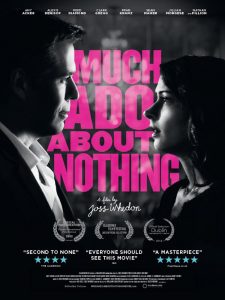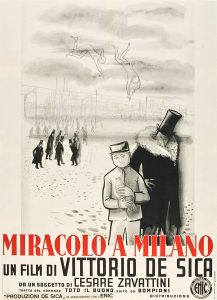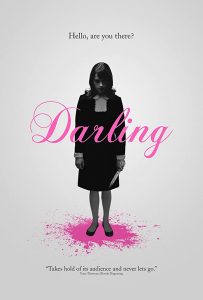 Legend has it that when Joss Whedon was filming The Avengers, he was forced by union rules into a two week break. During that break, he decided to adapt, direct, and score a Shakespearean comedy, because that’s just the kind of guy he is. (Okay, technically, probably only the principle photography happened during the fortnight and the rest came before and/or after, depending on what would make sense. But I have no way of knowing it didn’t all happen during his vacation, so!) It being the 400th anniversary of the bard’s death, the Alamo Drafthouse has been showing lots of adaptations lately, and Monday night, off we went to sup on the fruit of this legend.
Legend has it that when Joss Whedon was filming The Avengers, he was forced by union rules into a two week break. During that break, he decided to adapt, direct, and score a Shakespearean comedy, because that’s just the kind of guy he is. (Okay, technically, probably only the principle photography happened during the fortnight and the rest came before and/or after, depending on what would make sense. But I have no way of knowing it didn’t all happen during his vacation, so!) It being the 400th anniversary of the bard’s death, the Alamo Drafthouse has been showing lots of adaptations lately, and Monday night, off we went to sup on the fruit of this legend.
Despite my utter lack of qualification to review Shakespeare, I’m kind of forced to by circumstance. The acting is as good as you’d expect[1], and the direction was modern and noirish, both of which displayed some… well, I can’t tell if flaw is right, but it probably is, and that’s my English Lit degree focussed on mid-millennium British masters bias showing. So, let’s say, displayed some flaws in Bill’s work and then see if I prove my case.
Much Ado about Nothing has two plots. In the first and far superior one, two acid-tongued frenemies reunite after the fellow of the pair returns from campaigns abroad, and their friends trick them into either falling in love or admitting their real feelings for each other[2]. As far as I’m concerned, this story has no problems and is basically 100% hilarious. In the second story (which contrary to my ordering appears to be the main plot of the thing and the source of the title), the prince sets up his best friend with their host’s daughter after the friend has fallen in love at first sight, but the prince’s bastard[3] brother arbitrarily decides to interfere in the pre-wedding proceedings.
That story… well, first it does the “we love each other after five minutes because we’re both so very pretty” thing that Shakespeare parodied in Romeo and Juliet, only this time he plays it straight, which while not a story-breaker is certainly an odd choice. But then when John the Bastard enacts his evil plan to make it look like the host’s daughter bangs random people on the verandah every night, the prince’s friend doesn’t just break up with her, he publicly humiliates her at the altar. Which, you know, some people are assholes, and that’s fine. But her father joins in on the humiliation, and that’s less fine, although I’m forced to acknowledge that virginity in the 1500s was more important than family, however insane that sounds.
But least fine of all is that she wants him back and everyone sets about proving her innocence to win him back. I mean, the innocence, sure, but she wants him back??? That’s too skeevy, even for the 1500s.
But okay, that’s Shakespeare and the 1500s, and what can you do? It’s central to the plot, and however delightful Benedick and Beatrice are, whether in banter or askew courtship, there’s not enough there to fill both reels. The biggest failure was Joss’s alone. At the big wedding scene in the finale, the prince’s friend (now penitent and set to marry the host’s other female ward by way of apology for embarrassing the first daughter unto death[4]) says that he’ll marry whoever he’s been asked to marry, even “were she an Ethiope”, while the camera lingers on a black lady standing nearby, who we had never seen before and, the movie ending some five minutes later, were certainly never to see again. And it’s like, I get what he was going for, “look how uncomfortable this line that Shakespeare wrote is, you guys!” But it just didn’t work. I can’t really explain why, scenes that were far worse have worked far better for me[5], but after my gasp of shocked laughter acknowledging what Whedon had pointed out, I couldn’t really agree that it was worth the scene existing.
But these are, if not nitpicks, certainly neither of them enough to detract from how wonderfully presented the so-called backup plotline was. Lovely film, would watch again.
[1] I mean, yes because they’re all Whedon alums, but also because it’s Shakespeare. I assume it’s that people won’t submit slipshod quality if it’s the bard rather than that his writing is so good, people are forced to be better actors.
[2] Reader’s / viewer’s choice, really. Take your pick.
[3] Bastards are evil by virtue of their ungodly births. It is known.
[4] Because, 1500s. JFAM, the past, what is wrong with you?
[5] Tropic Thunder springs frequently to mind. “What do you mean, ‘you people’?” “…what do you mean, ‘you people’?!”
 As you have perhaps guessed by the title, Mary and I finally watched another movie in the so-called “weekly” letterboxd dot com challenge, about which I’ve said more than enough previously. This, the seventh in the sequence and representing the beginning of November[1], was Polish Film School[2] week. I had (of course) already seen most of these, but the first film by newcomer Roman Polanski caught my eye, and we decided to give it a whirl.[3]
As you have perhaps guessed by the title, Mary and I finally watched another movie in the so-called “weekly” letterboxd dot com challenge, about which I’ve said more than enough previously. This, the seventh in the sequence and representing the beginning of November[1], was Polish Film School[2] week. I had (of course) already seen most of these, but the first film by newcomer Roman Polanski caught my eye, and we decided to give it a whirl.[3]
 The most important thing I can probably say about
The most important thing I can probably say about  Legend has it that when Joss Whedon was filming
Legend has it that when Joss Whedon was filming